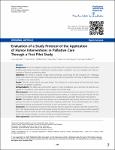Evaluation of a Study Protocol of the Application of Humor Interventions in Palliative Care Through a First Pilot Study
| dc.contributor.author | Linge-Dahl, L | |
| dc.contributor.author | Heintz, S | |
| dc.contributor.author | Ruch, W | |
| dc.contributor.author | Bley, M | |
| dc.contributor.author | von Hirschhausen, E | |
| dc.contributor.author | Radbruch, L | |
| dc.date.accessioned | 2023-11-28T10:27:35Z | |
| dc.date.available | 2023-11-28T10:27:35Z | |
| dc.date.issued | 2023-09-01 | |
| dc.identifier.issn | 2689-2820 | |
| dc.identifier.issn | 2689-2820 | |
| dc.identifier.uri | https://pearl.plymouth.ac.uk/handle/10026.1/21726 | |
| dc.description.abstract |
Background: Humor and laughter might have an alleviating effect on pain threshold and enhance coping and building relationships. However, randomized controlled studies in palliative care have struggled with high percentages of attrition and missing values. Objectives: We aimed to evaluate a study protocol through a pilot study for the evaluation of a multistage humor intervention with psychological and physiological outcome parameters that may be applied successfully in a palliative care environment. Design: This pilot study utilized a pre–post design. The inclusion of a control group for the final study setting recruiting 120 patients is planned. Setting/Subjects: The study was a monocenter study in a clinic for palliative care in Germany. All patients were eligible for recruitment. Seven patients were recruited for the pilot study. Measurements: Interventions were developed using a humor training for psychiatric patients. Quantitative sensory testing for pain threshold testing and questionnaires on humor as a character trait, pain intensity, life satisfaction, and symptom burden were planned to be evaluated before and after three humor interventions. Results: The feasibility of the original study design was re-evaluated after pilot testing. Only two out of the seven patients were able to complete two interventions, requiring modification. Fewer questionnaires, less complex physiological testing, and reduction from three to two interventions were then planned. Conclusion: The initial planned research methodology must be adjusted for patients with high symptom bur-den. In the experimental group of the final study setting, the effects of one to two interventions will be evaluated measuring oxytocin levels in saliva and using standardized questionnaires to determine cheerfulness, life satisfaction and symptom burden, as well as assessing as-needed medication. Trial registration:DRKS00028978 German Registry of Clinical Studies. | |
| dc.format.extent | 239-248 | |
| dc.format.medium | Electronic-eCollection | |
| dc.language | en | |
| dc.publisher | Mary Ann Liebert Inc | |
| dc.subject | end-of-life | |
| dc.subject | humor | |
| dc.subject | intervention | |
| dc.subject | palliative care | |
| dc.title | Evaluation of a Study Protocol of the Application of Humor Interventions in Palliative Care Through a First Pilot Study | |
| dc.type | journal-article | |
| dc.type | Article | |
| plymouth.author-url | https://www.ncbi.nlm.nih.gov/pubmed/37732024 | |
| plymouth.issue | 1 | |
| plymouth.volume | 4 | |
| plymouth.publication-status | Published | |
| plymouth.journal | Palliative Medicine Reports | |
| dc.identifier.doi | 10.1089/pmr.2023.0014 | |
| plymouth.organisational-group | |Plymouth | |
| plymouth.organisational-group | |Plymouth|Research Groups | |
| plymouth.organisational-group | |Plymouth|Faculty of Health | |
| plymouth.organisational-group | |Plymouth|Faculty of Health|School of Psychology | |
| plymouth.organisational-group | |Plymouth|REF 2021 Researchers by UoA | |
| plymouth.organisational-group | |Plymouth|Users by role | |
| plymouth.organisational-group | |Plymouth|Users by role|Academics | |
| plymouth.organisational-group | |Plymouth|REF 2021 Researchers by UoA|UoA04 Psychology, Psychiatry and Neuroscience | |
| plymouth.organisational-group | |Plymouth|REF 2021 Researchers by UoA|UoA04 Psychology, Psychiatry and Neuroscience|UoA04 Psychology, Psychiatry and Neuroscience MANUAL | |
| plymouth.organisational-group | |Plymouth|Research Groups|Plymouth Institute of Health and Care Research (PIHR) | |
| plymouth.organisational-group | |Plymouth|REF 2028 Researchers by UoA | |
| plymouth.organisational-group | |Plymouth|REF 2028 Researchers by UoA|UoA04 Psychology, Psychiatry and Neuroscience | |
| dc.publisher.place | United States | |
| dcterms.dateAccepted | 2023-07-21 | |
| dc.date.updated | 2023-11-28T10:27:17Z | |
| dc.rights.embargodate | 2023-11-30 | |
| dc.identifier.eissn | 2689-2820 | |
| rioxxterms.versionofrecord | 10.1089/pmr.2023.0014 |


